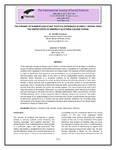The Tyranny of Numbers and Ethnic political patronage in Kenya: Lessons from the United States of America’s Electoral College Vote Process
Abstract
Ethnic diversity, though an obvious sign of Africa’s cultural richness and social capital, is equally a
source of tension between communities and nations and is considered as a potential source of
conflicts and a handicap in the construction of a nation-state. The cohesion of ethnic entities and
of regional specificities thus appeared, one would expect, as a prerequisite to this construction.
Political leaders who have been at the helm of Africa’s independent nations assumed this
objective which featured in a recurrent manner, as an essential component of their
pronouncements and discourse on nation building. Mistrust for ethnicity seemed to have been
fanned in Africa and the style of governance could be, in the main, based on neo-patrimonial
patronage, that is, the absence of distinction between public and private resources or rather the
blurred distinction between the public and private spheres. This type of governing style could
have the motive of promoting “ethnocracy” as a tool for legitimizing power and has put in place
political patronage on the basis of ethnicity ( Medard (1990, Dazon, 2000, Lemarchand, 1972 and
Sall &Nsamenang ,2011). In this scenario of Africa’s ethnicity, Kenya is not an island. This paper
has the intent of an understanding of how to harness and nurture as well harvest the principles
of democratic governance in a country that has ethnic diversity, especially for minorities using
the example of the Kenya’s 2013 presidential elections while drawing lessons from United States
of America’s Electoral College Vote.
Collections
- School of Education [203]

